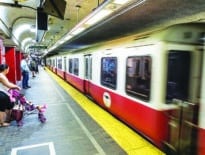
With far fewer connections to wealth than the average white entrepreneur and facing structural barriers, many people of color who want to start their own small business have a hard time finding seed capital.
When Berkshire Bank’s Malia Lazu talks about entrepreneurship, she evokes a kitchen table, the place where family members and friends first talk about investing in the business. For entrepreneurs of color, the wealth gap between whites and people of color in America means these conversations, and the business itself, often never happen.
To help these entrepreneurs, Berkshire has introduced a new product that provides access to funds not from family, but from the community.
“It’s something that we believe deeply in that in order to close the wealth gap – which we think is important and something that we want to help do as a community bank – that we need to have minority entrepreneurs thriving and starting businesses,” said Lazu, Berkshire’s chief experience officer and an executive vice president, “And so, we’re looking at creating a pipeline from the kitchen table to traditional banking and investing for businesses.”
Berkshire Bank launched the Friends and Family Fund in August, powering it with a certificate of deposit product that funds small business loans for people of color. Operated in partnership with the California-based organization The Runway Project, the program will use a “community underwriting process” for determining loans instead of credit scores.
Banks Must Break Down Biases
Recent studies have shown a wealth gap in the U.S. According to the Federal Reserve’s 2016 Survey of Consumer Finances, conducted every three years, the median net worth for a black or African American family was $17,600 compared to $171,000 for a non-Hispanic white family. The U.S. Census Bureau’s Survey of Income and Program Participation, based on 2015 data, showed white non–Hispanic households with a median net worth of $139,300, while black non-Hispanic households had $12,780.
Prospective entrepreneurs often face challenges getting access to capital because investors and banks don’t understand the product being offered or the community being served, said Margaret Simms, a nonresident fellow at the Washington-based nonprofit Urban Institute.
Simms, who is not involved with Berkshire Bank’s effort, coauthored a research project about economic barriers faced by African American men in Pittsburgh. Many entrepreneurs of color there don’t have the ties with a wealthy potential investor that would help them raise seed capital for a new business, she said.
“There’s a huge relationship gap – we may not have the opportunity to sit at the same table,” Simms said. “If you’re going to go with the folks you went to school with or go to church with, and I’m not in that community, I may not have an equal chance even if I have as good or even a better product.”
Seed Money May Lead to More Customers
Berkshire will spend a year piloting its new loan product in Massachusetts, Lazu said, with the goal of introducing it in other states. The loans will be administered by The Runway Project, which launched its first Friends and Family CD in 2017 with Self-Help Federal Credit Union in Oakland.
Anyone can invest in the CD, which will pay interest at the bank’s standard CD rates. Lazu said when Berkshire Bank launched the product, she heard from an investor who planned to open a CD for $250,000.
She pointed out that the product is not charity. The CDs will fund loans up to $20,000 at a 4 percent interest rate. While administered by The Runway Project, the loan will be treated like a normal commercial loan on Berkshire Bank’s balance sheet.
Lazu said the loans are intended as startup money rather than a credit line. The bank expects applicants to contribute to the local economy, Lazu said, including people who open brick and mortar businesses and offer services. The bank has a goal to distribute $1 million in loans during the first year, and there’s no cap on the program. The loans could serve as a pipeline to the bank’s traditional products as the businesses grow, Lazu said.
In Oakland, 22 loans have been disbursed totaling $397,000 through June 2019, according to The Runway Project’s most recent annual impact statement. Businesses range from vegan restaurants, skincare retailers and clothing stores to services offering wealth management and graphic design.
Unlike many traditional loan products, credit scores will not be considered as applicants are evaluated in an effort to sidestep a frequent barrier to expanding access to credit among people of color, who are on average poorer and have worse credit than whites. Instead, a five-person committee with two bank representatives and three community members will evaluate each loan application, meeting with the business owner and reviewing the business plan.
“We know that credit scores tend to be biased. We know they’re not necessarily an example of repayment and we know that we have these institutional and structural biases that sit within banking,” Lazu said. “And if we don’t find ways to address them, then we’re really just doing window dressing, and we’re not going to see the long–term impact that we want.”




 |
| 

